- Home
- Taylor Caldwell
A Prologue to Love Page 17
A Prologue to Love Read online
Page 17
“You are very kind, sir,” said Captain Allstyn, and Caroline was startled at the man’s pure well-bred English accent, so strange in comparison with his lumbering appearance, his gross red face, his Vandal’s eyes, his stained uniform. She was also impressed by the fact that he did not bow or scrape to either her father or herself.
Captain Allstyn turned to Caroline. “I trust,” he said in that patrician accent, “that Miss Ames’ first visit will be pleasant for her.”
Caroline could only stare at him mutely. He was deferential, as all gentlemen were deferential toward ladies. He stood with his hands at his sides in the exact posture of the young men at the dancing school, waiting for any remark she might care to make, his head inclined slightly and attentively.
“Oh — yes,” stuttered Caroline. Captain Allstyn considered her. A lump of a girl, a frightened girl, but a girl of family and breeding. An innocent young thing, like the horsy girls in Sussex who prattled and blushed and stammered and loved dogs and the paddock and trembled when they were presented at Court and rushed home at once thereafter and married bumbling young men like themselves. Captain Allstyn had once been one of those bumbling young men after his short career in Her Majesty’s Navy. He had even married a girl like Caroline. But the sea had called him back, back from the hunts and the horses and the dogs and the awkward young girls and the sunny quiet fields and the rosy brick houses and teatime.
He often heard it remarked that John Ames was a ‘nobody’. But Captain Allstyn felt this to be untrue. Those ostensibly aristocratic were too frequently plebeian; the true aristocrat cared nothing for the opinions of others nor for any impression he might make. He lived, an individualist, for himself. Even if the aristocrat engaged in nefarious activities, he did so without pretense to virtue and with no anxiety to hide what he was. Quite often he was an adventurer, but he always led and never followed. John Ames was an aristocrat, as was his captain, and that was the secret they both recognized in each other. For this reason Captain Allstyn was not only commander of the Queen Ann but the captain of John Ames’ mighty fleet of ambiguous ships.
The captain looked curiously and openly into Caroline’s face. He saw the intelligent eyes, the glint of shy fear, and behind them both he saw the shine of young power and dignity. He had expected a pretty girl, for John was handsome. But prettiness did not particularly affect Captain Allstyn, who preferred it in the better bordellos, where it could be sampled in variety. No one would dominate this girl who had no charm but her uncertain smile. Captain Allstyn was relieved. He expected to be with the Ames Line for many, many years, and it was excellent to know that his next employer would be this sturdy girl grown to womanhood and to impressiveness.
Caroline was confused. It had overwhelmed her to know that her father owned all this; she needed concrete evidence, such as the money in her purse, to reassure her that she was not vulnerable and that never again would she be exposed to what the world could and did do to the helpless. She liked Captain Allstyn immediately, and this also startled her. She was not accustomed to liking people. Totally inexperienced though she was, her intuition enlightened her considerably concerning the captain.
“Are you coming aboard, Mr. Ames?” asked the captain.
“Yes. Of course. That is why I brought Caroline,” said John. He looked at the captain intently. “I thought there were things she should know.”
The captain smiled briefly. Caroline stared at the freighter. “We are boarding that, Papa?” The freighter appeared formidable to her, like a long black shark, filthy and weather-beaten. John took her arm. “Certainly.”
Caroline had never been aboard any ship in her life. She hesitated, fearful again of the brutish police, the ominous dark faces of the men on the ships. But she saw no derision, no ridicule, no slyly exchanged glances of amusement. She went on with her father, the captain following just behind her left elbow. She could hear their footsteps, loud against the uneasy whispering of the sea, sharp against the sinister quiet. They might have been proceeding against an immense stage-set of painted ships, painted sky, and painted men, with only the ocean to relieve the silence.
Sturdily she climbed the gangplank, lifting her unbecoming dress, the sun hot on her face. All the air was filled with strong smells steeping in the heat. She looked about her when she reached the deck; it heaved a little; the wood was dark with water and stained. She was disappointed. The beautiful clippers she had seen against the sky in the main harbor had enthralled her, their sails white and lofty in the sun, like pulsing and gigantic birds. While the other girls exclaimed about their ‘prettiness’ she had felt their wild grandeur, their solitude, their air of leaving the world and rising into light.
The Queen Ann had masts for sails, as well as smokestacks. The sails were down. The ship was ugly and even repellent. The deck was slippery. The whole vessel had a look of decrepitude, and one thought of derelicts. The hatches were open and the cranes in place. It smelled of oil and tar and leather and bananas and wet wood and fish. It was very large; the men in the bow appeared diminished. Caroline wanted to please her father. “It’s big, isn’t it?” she murmured.
Captain Allstyn answered her in his gentle and cultured voice. “It is one of the biggest on the seven seas, and about the fastest, Miss Ames. It is your father’s flagship.”
“Come, Caroline,” said John, and took her arm again. He led his daughter down a flight of narrow stairs to the deck below, where lanterns were hanging from walls to give light. Here the smells were intensified, the floor only slightly cleaner than the deck. A feeling of secrecy came to Caroline; she saw that the passageway ended very close at hand, and a big locked door, braced with iron, faced her. John took out a bunch of keys and fitted one in the lock and opened the door.
The long passageway beyond was still closed and without portholes, but the lanterns were now fixed lamps on the walls, the oil burning behind glass shades of many colors ornamented with gilt. The walls themselves, smooth as brown satin, were hung with fine engravings and paintings set in gold frames, and the floors had been covered with rich oriental carpets, narrow and brilliant as woven jewels. A fragrance hung here of perfume and spice and rich food and wine. Along the inner wall stood many carved doors, polished and urbane, with gold-plated handles. The farther door, similar to the one they had opened, now swung back, and two young men in gold and brown livery appeared. They hurried toward John and his amazed daughter, bowing neatly at almost every step.
“No, no,” said John. “We need nothing. Except, perhaps, in about half an hour, you may bring us some brandy and a little Madeira, and wafers.”
The young men halted immediately but continued to bow. John opened one of the doors to the left and motioned Caroline to go through it.
She had often heard some of the girls in school rapturously describe their staterooms after their parents had taken them to Europe, so Caroline had some slight idea of what staterooms were. But she doubted, as she looked at the sudden splendor of the room beyond the door and as her feet sank into deep, colored carpets, that any stateroom ever resembled this for luxury. It was large; it had three square portholes across which had been drawn thin, glittering golden tissue. It was a room for a potentate, for a prince, with its gilded lamps, its small marble tables, its crystals, its gold-painted carved furniture upholstered in satins and velvets and damask, its carved pale ceilings and walls touched with gilt, its divans and love seats, its little marble fireplace, its small buhl cabinets filled with objets d’art. She had a glimpse of a room adjoining, a bedroom with a swan bed, with furnishings to match.
The outside light, drifting through the golden tissue at the windows, filled the room with a warm yellow glow. Caroline looked mutely at her father. He smiled a little, unpleasantly. “Sit down, Caroline,” he said. She obediently perched on a French settee, her feet and knees pressed together, her clutching hands tightening about her purse. Her father sat opposite, near the windows, and the yellow light rippled over him and heightened the bitt
er blue of the eyes that fixed themselves upon her.
“There are several rooms like this on this deck,” he said. “You see, it is not only a freighter, Caroline.”
“It is locked,” she murmured. “To protect — all this,” and she made a clumsy gesture with her gloved hands.
“To protect more than this,” said John. He looked down at his right hand, which lay on the arm of his chair. Damn it, the girl had to know, if she was to act intelligently in the future. But he evaded her eyes and frowned.
“These are your quarters, Papa?” she asked, and smiled, thinking of her handsome father in this room when at sea.
“No,” said John. “I never travel on my own ships, and particularly not this.”
“Why?” she asked in astonishment.
He turned a large signet ring, very old and very precious, on his finger. Some of his friends in Boston smiled at that ring and talked about it when he was not present. It was an heirloom, they said, which he had bought somewhere and to which he was not entitled. John never enlightened them that the signet ring had belonged to many generations of his mother’s family and had been given to the first notable Hollingshead by George II.
“Caroline,” he said at last, “I want you to listen to me carefully. The docks outside are mine; the freighters and the ships are mine. This is mine. I have many other enterprises; I keep them only as long as they pay me a profit. This fleet of ships is paying me larger profits every year.” He paused and frowned again. Caroline listened attentively. “I never travel on any of my own ships, particularly not this, as I’ve told you, because in the event of any trouble it would be best that I not be here. The ships are registered, yes, in the Ames name, but that is all. My captains, and especially Captain Allstyn, are responsible for the cargoes. I have nothing to do with the cargoes; they are the responsibilities of others. There is not a port in the world which they do not touch regularly.”
Now Caroline was utterly baffled. The wide openness of her eyes and innocent face were turned to him, trying to understand.
“For instance,” he said, watching her, “this freighter, while carrying cargo, also carries much more precious merchandise. The rooms on this deck are used exclusively for passengers who wish to leave their respective countries for a time, or for life, and who must do it without delay, without clearances, without public notice. The Queen Ann has carried bankers, princes, merchant chiefs, great industrialists, noblemen of many nations, even a petty king occasionally, and their ladies, to countries far from their own. The last occupant was a jewel merchant with a large personal cargo. The price of their passage is paid to me. I find it very lucrative.”
Caroline, still looking at him with that calm innocence, was silent. He waited. He let her think. Then all at once she dropped her eyes and stared at her purse.
“I see you understand,” said John.
“I understand,” she said.
“But there is something else you do not understand,” he said. “Great fortunes, immense fortunes, are rarely made honestly, and certainly not very fast. It was not my intention to start a dynasty slowly and carefully. And legitimately. That would have taken too long for my purposes. Besides, what is ‘legitimately’? Some of the mightiest fortunes in America, now honored and scraped to reverently, were made in a fashion similar to mine. The Delanos, for instance, made their fortune through opium, the Astors through their exploitation of the Indians and their furs, the Vanderbilts through their ruthless manipulation of railroads and stock market. Yet who despises them? Presidents and kings are delighted to entertain them, and as delighted to be entertained in turn. One of the really tremendous fortunes in America was made by gun-running to the South during the war; another, equally tremendous, was made by blackbirding, the running of naked black savages from Africa to America in spite of intricate and punitive laws. The heirs of all these have married into some of Europe’s noblest families; their children are now aristocrats. Their marriages and their deaths and their births make notable headlines in the newspapers.
“Murder of the helpless, ruin of the weak, theft, exploitation and despair and death have attended the making of these fortunes for a few. Not to mention, of course, the subornation of politicians, princes, and statesmen, who profited by glancing the other way or by quietly assisting.
“Yet who cares? Who denounces? Only last month the daughter of one of these men, who had been admitted to the most elegant schools in the world and whose debut cost countless thousands of dollars, was married to a British duke, and all the world applauded, and the newspapers went mad in their ecstasies and their stories of ‘the little duchess’, and the very exploited mobs themselves became delirious with joy, though it was on their own suffering bodies that the fortune had been made.
“Caroline, there is only one crime which the world will not forgive, and that is poverty. And long ago, as I told you, I was determined never again to commit that unpardonable crime.”
All the color had left Caroline’s face. Only her golden eyes stood in that face, wide and staring and mute. John stood up and began to pace about the room, his head bent, his hands in the pockets of his striped trousers, his long black coat hanging from his lean shoulders.
“The penalty of failure, honesty, and weakness is ignominy, degradation, and obscurity, as well as hunger and despair. Did I make this world? No. But I met it on its own terms. Money, or your life. The prattle of clergymen and philosophers does not change these things. It was always so. It will always be so. Laws may be passed in the future, as they’ve been passed in the past, to restrain the immutable law of the world, to change it, to modify it. These will never succeed. The giants will always ignore punitive and restraining laws; laws were not made for giants, but only for pygmies. You see, the giants can buy anyone, anywhere, or if they can’t buy them they can destroy them. Revolutions have been instigated against princes who defied the giants and tried to protect the weak; Presidents have gone down under shameful accusations when they opposed the giants. Calumny can be bought and used as a weapon. The politician, backed by the giants, will always win elections. For to whom do the people really listen? They listen to the man or the organization with cash. You see, there is no virtue in the people, either. They are just as hungry and as ruthless and as terrible as their masters.”
Like jetsam and flotsam, broken phrases from the Bible rose to the surface of Caroline’s mind. The virtue embedded in her character, the simplicity which was part of her nature, the honor which was her very spirit was outraged, terrified, and sickened. A passionate revolt stirred her, and a loathing, not for her father, but for the world which had made him what he was. He had stopped before her now and was looking down at her still and stricken face and averted eyes.
“Well, Caroline?” he asked with gentleness.
“I think,” she muttered, “that I’d like a drink of water.”
He pursed his lips. “I think a little brandy would be best,” he said. He pulled a bell rope. Caroline did not move; she was staring at her shoes, a large figure as motionless as stone. She was not even aware of the entrance of the young man with a silver tray holding brandy and wine bottles and crystal glasses. When a glass, very slender and thin and filled with a golden liquid, appeared before her eyes, she started. She made a slight gesture of repugnance and rejection, but her father’s hand remained insistently before her. She could see its long white firmness, the signet ring on the finger, the tight knuckles and clean pale nails, as if in a glaring and hurting light. Then she took the glass.
“Drink it,” said John. “Slowly.”
She automatically put the glass to her lips and sipped. The stinging brandy touched her tongue. It reached her stomach. It lay there like a burning coal, and tears crept about her eyelids from the sensation. When she looked at her father he was sitting opposite again and slowly and morosely drinking.
“Papa,” she said, and coughed.
“Yes, Caroline.”
“Papa,” said Caroline, and her voice
shook. “I know — knew — there were bad and wicked people in the world. I’ve read about them in history. But I always thought they were — strange. Unusual. I thought they didn’t resemble — all the rest of us. I thought — conscience — I thought even the bad people had a conscience and that at times they were ashamed, or frightened, or disgusted with themselves.” She stopped and looked at him despairingly.
John raised his eyebrows and sipped a little. “Conscience?” he repeated. “What a child you are, Caroline. Man is an animal, Caroline; he is different from the other animals because he has intelligence, which makes him all the worse because it gives him a larger outlet for his savagery, his terribleness. I know hundreds, perhaps thousands, of men who have no more conscience than a tree or a stone. Are they unhappy, or do they accuse themselves? No. Not at all. They are the happiest, most contented, most satisfied, and most serene people in the world. They enjoy living, and they live, not merely exist. Many of them are absolutely charming. I believe even the Bible says that the children of darkness are wiser in their generation than the children of light. As for those with a conscience — Caroline, they are the most miserable of people. They are the failures, the unhappy, the incomplete, the despised of their families and their neighbors. They die, as it has been said, unwept, unhonored, and unsung. Very few even attend their funerals. I don’t think there are many of them, anywhere, so they aren’t a problem. Caroline, if you are thinking of religion, I will tell you this. One of the worst scoundrels I have ever known, who had caused the deaths of scores of men while he was getting his fortune, died only a month ago in New York. It was almost impossible to reach the church where the funeral was being held. I had to leave my carriage several streets away and proceed on foot, though the police were out in platoons to keep order, riding on their horses, swinging their clubs against the heads of the urgent but reverent mob, and whistling all over the place.

 Testimony of Two Men
Testimony of Two Men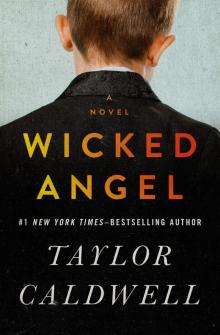 Wicked Angel
Wicked Angel The Arm and the Darkness
The Arm and the Darkness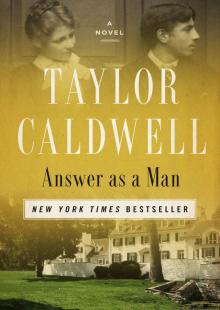 Answer as a Man
Answer as a Man Grandmother and the Priests
Grandmother and the Priests On Growing Up Tough: An Irreverent Memoir
On Growing Up Tough: An Irreverent Memoir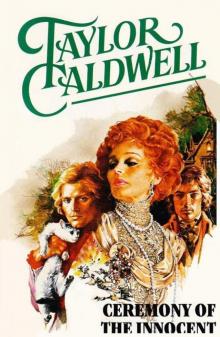 Ceremony of the Innocent
Ceremony of the Innocent The Listener
The Listener Bright Flows the River
Bright Flows the River The Earth Is the Lord's
The Earth Is the Lord's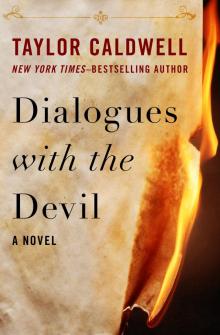 Dialogues With the Devil
Dialogues With the Devil A Tender Victory
A Tender Victory This Side of Innocence
This Side of Innocence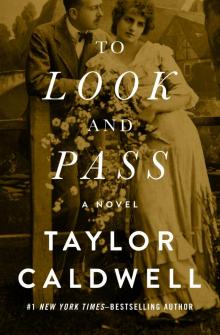 To Look and Pass
To Look and Pass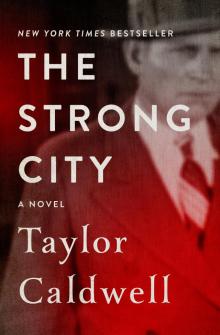 The Strong City
The Strong City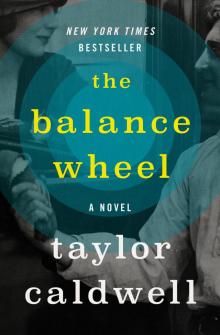 Balance Wheel
Balance Wheel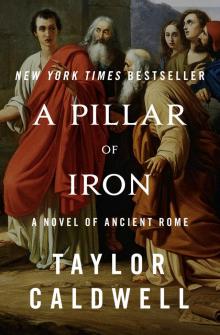 A Pillar of Iron: A Novel of Ancient Rome
A Pillar of Iron: A Novel of Ancient Rome Glory and the Lightning
Glory and the Lightning Dear and Glorious Physician
Dear and Glorious Physician The Wide House
The Wide House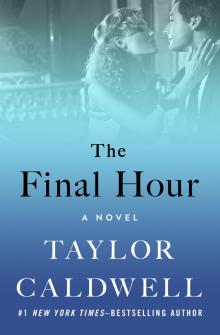 The Final Hour
The Final Hour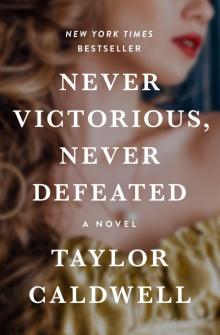 Never Victorious, Never Defeated
Never Victorious, Never Defeated Unto All Men
Unto All Men The Turnbulls
The Turnbulls Your Sins and Mine: The Terrifying Fable of a World Without Faith
Your Sins and Mine: The Terrifying Fable of a World Without Faith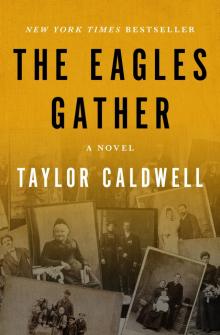 The Eagles Gather
The Eagles Gather Let Love Come Last
Let Love Come Last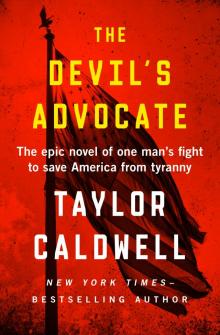 The Devil's Advocate: The Epic Novel of One Man's Fight to Save America From Tyranny
The Devil's Advocate: The Epic Novel of One Man's Fight to Save America From Tyranny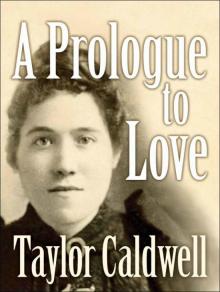 A Prologue to Love
A Prologue to Love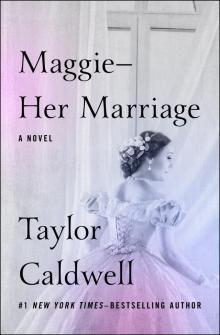 Maggie: Her Marriage
Maggie: Her Marriage The Late Clara Beame
The Late Clara Beame Melissa
Melissa Great Lion of God
Great Lion of God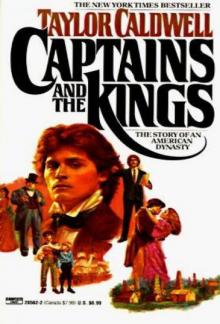 Captains and the Kings
Captains and the Kings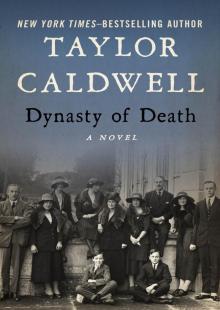 Dynasty of Death
Dynasty of Death No One Hears but Him
No One Hears but Him The Sound of Thunder
The Sound of Thunder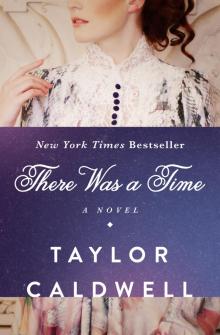 There Was a Time
There Was a Time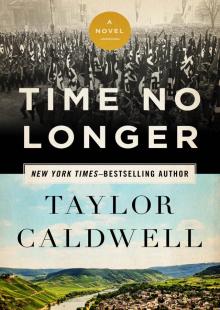 Time No Longer
Time No Longer I, Judas
I, Judas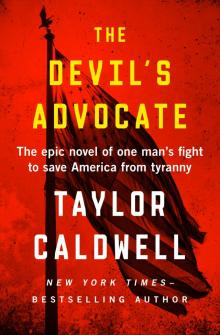 The Devil's Advocate
The Devil's Advocate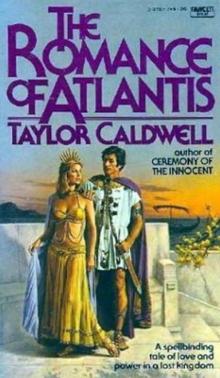 The Romance of Atlantis
The Romance of Atlantis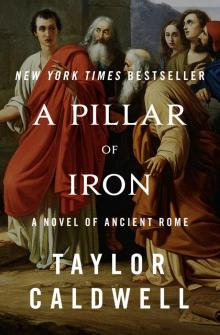 A Pillar of Iron
A Pillar of Iron On Growing Up Tough
On Growing Up Tough Your Sins and Mine
Your Sins and Mine